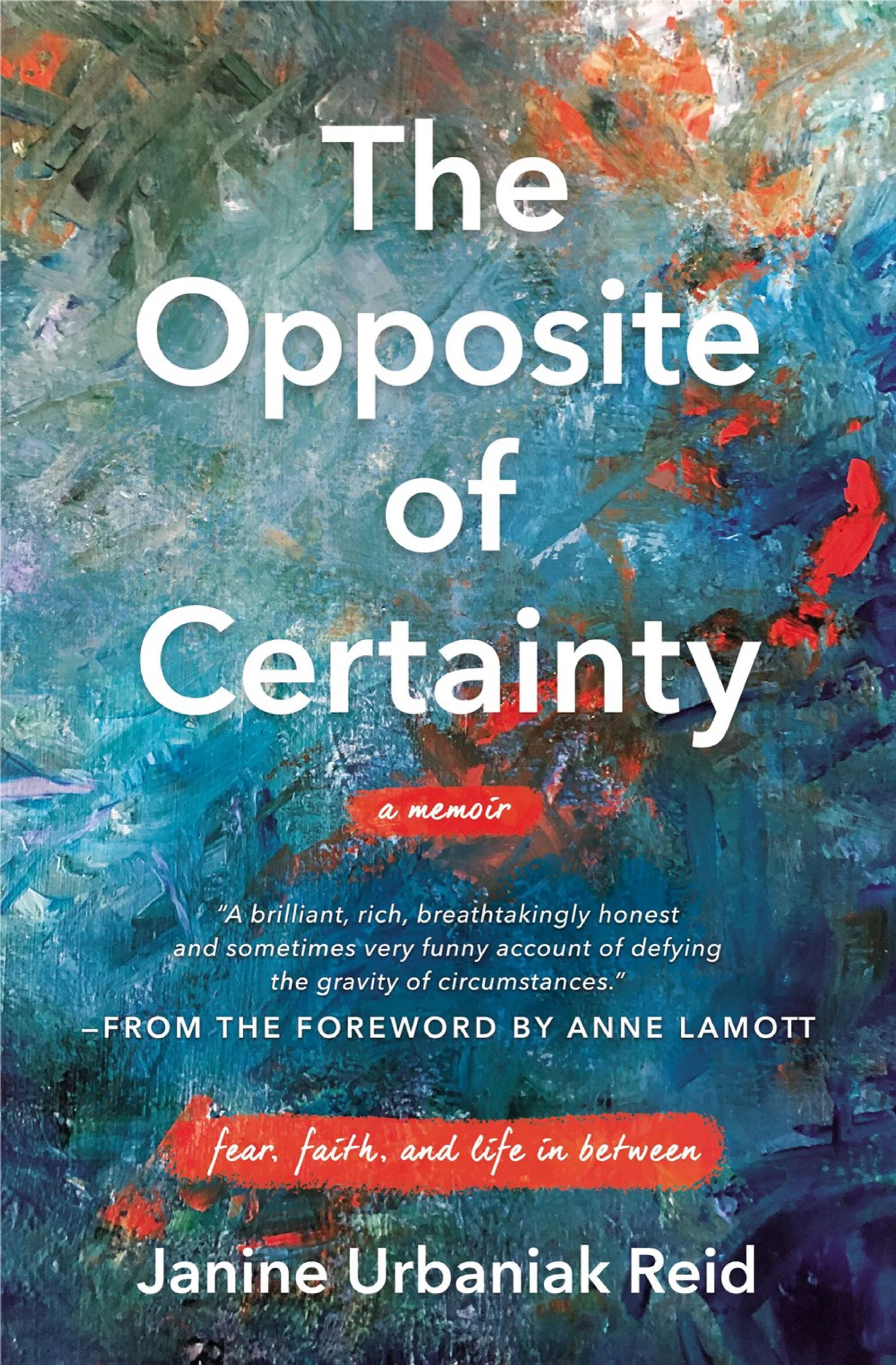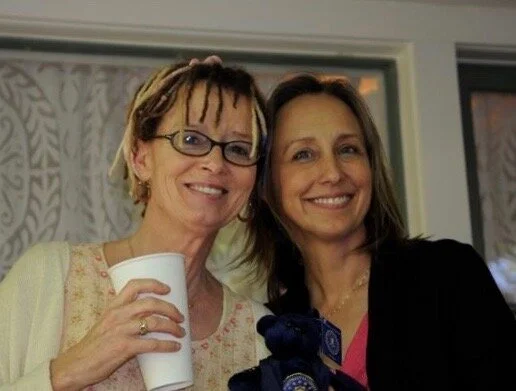Q and A: Anne Lamott and Janine Urbaniak Reid on When Life Takes a Tragic Turn
/“It is a book about life with a capital L. About marriage, motherhood, the unfathomable salvation we find in friendships and nature,” writes Anne Lamott in her foreword to Janine Urbaniak Reid’s The Opposite of Certainty (HarperCollins Christian, W Publishing, Thomas Nelson). Reid’s young son was diagnosed with a brain tumor, living with chemotherapy and MRIs until his tumor hemorrhaged when he was 13, causing a massive brain injury that required him to learn anew how to walk, speak, and eat. Reid recounts his story, and her family’s story as they navigate this new terrain, and Reid grapples with her own tendencies toward perfection. “People like me try to control everything we possibly can to be safe,” Reid writes in her deeply affecting memoir. “Sometimes, we’re able to pretend that the ground underfoot is bedrock and the sky above predictable.”
In short, finely honed chapters, Reid recounts extraordinary challenges and evokes these experiences with warmth, wit and bit of irreverence. Quite simply, she writes: “My hope is to offer a companion in uncertain places, a place to identify in the heart of what’s real and what matters.”
Best friends Lamott and Reid live in the San Francisco Bay area, and Lamott led this conversation for The National.
AL: What moved you to write The Opposite of Certainty? How did the book -- and how did you -- change in the process?
JUR: I wrote the book that I wanted to find in a crisis, a story that’s faith-filled, but didn’t look away from the fear and doubt that platitudes can’t touch. I wanted to figure out what had happened to me and the people I love the most, as if understanding might give me mastery over an out-of-control life. I was also trying to find me again after having my life distilled into the role of “Mother, then Desperate Mother,” always with a side of wife, friend and sober woman. But who was I anyway, and did I just lose or find me?
There was an element of “telling on” people early in the process. The first draft was very much “Annoying People and the Stupid Things They Said.” This was wrung out after a few thousand drafts, transformed into a grudging compassion for all the flawed humans (like me) who really meant to show up or say the right thing.
Ultimately, I didn’t find control, and I wasn’t able to tame the uncertainty. But it turned out that I could survive what was real and true, without pretending to be better, smarter or more spiritually evolved. What changed – of course – was me. I came out of this story with my own body scarred, stronger but softer, more filled with faith and less ruled by should-s, knowing less about God but believing more.
AL: What was revealed in re-living this life-defining experience through writing?
JUR: Memoir needs a rearview mirror to contextualize the story, a safe distance to feel, see and hopefully understand. I wrote about a period of time when my son Mason was young, and the medical crisis that changed everything. The writing gave me the opportunity to feel what I’d been forced to lock away – terror, grief, anger. That wasn’t fun. But there was also good unearthed in the fine-tooth-combing of the experience, threads of grace that I’d been too busy to notice. It was challenging because the medical crisis wasn’t really over while I was writing, it had just morphed into a new stage. Mason was still recovering. We all were.
I write about not being able to tie neat bows around difficult experiences, but I think that’s exactly what I wanted to do. It was a quest for a genuine optimism. And there’s a place where optimism bleeds into denial (which I call a close personal friend).
I wasn’t honoring Mason by pretending the challenges he lives with aren’t as difficult as they are. Then again, I couldn’t allow myself to drown in the unmanageability of it. It was like learning to swim. I couldn’t propel myself above the cold water of this experience no matter how hard I tried; but when I struggled, I sank.
Best friends Anne Lamott (L) and Janine Urbaniak Reid (R)
There’s a profound spiritual truth in learning to float. Stop resisting, breathe, relax and notice what is. That’s what the writing did for me. And like any good swimmer (and these are definitely ocean waters) I reflexively braced for the next wave.
Of course, I wanted to propel us to the ending of my choosing and land in a safe place. It turned out there was a miracle, but it wasn’t recognizable through my old prescription lenses. The writing put this into focus.
AL: How did your relationship with faith change?
JUR: Somehow, I picked up the idea that a spiritually evolved person wouldn’t feel like I do. She’d have answers, a better disposition, and probably weight 10 pounds less. It comes back to the inspiration for the title The Opposite of Certainty. Paul Tilith said, “Doubt is not the opposite of faith, it is one element of faith.” And your take on that, “The opposite of faith isn’t doubt but certainty.” I grew up thinking prayer was something you did on your knees. If you were good - preferably perfect - God might listen.
But turns out spiritual grace is a balm for the vulnerable, weak places, the so-called imperfections. I just need to ask for help. And having faith means not giving up. It’s more of a muscle than an idea. It’s strengthened whenever I take another step not knowing where my foot is going to land, when I do the-next-right-thing while afraid, and speak a kind word rather than lashing out in fear. It lives in the doing rather than the figuring out. Writing and living the story, I began to recognize the improbable good that shows up, and notice the strength I’m able to tap, especially when I’m exhausted and it all feels like too much.
AL: How have you managed to live such an uncertain life for so long? What did you learn that might help the rest of us walk through the uncertain and unknown?
JUR: First I need to say what’s true to someone who won’t expect me to be better than I am. There’s a tendency in this world to meet tragedy with cheerful memes and social media posts shaming us into positive thinking. It’s as if we could skip the terrifying, exhausting, painful parts and jump to wisdom and insight. But I need to say what is. I can’t touch real gratitude until I get real.
I need to admit I’m afraid, petty, judgmental and ungrateful. My focus clears and I’m more likely to spot the improbable good in this place I’d prefer not be.
It helps to come back to where my feet are, blue socks on a grey rug. Right here, right now am I okay? Not next week, not next year, right now in this moment. Am I okay? If yes, that’s a lot and let’s rest here. If not, let’s sit together until this moment passes. Then we’ll breathe through the next together too. It’s like labor. A new reality is being born and we’re not sure how long it will take or what it will be like. Healthy snacks are good. Lots of water and rest. And pretty soon, hour by hour, we’ll come through another day, and eventually things will shift on the inside or on the outside. We is another essential. We’re not alone, even when separated by buildings and walls. We’re here, the other humans, and we’ve done hard before.
JUR: Janine asks Anne: As my closest friend during the living (and the writing) of the story, you are a prominent character in the book. What’s it like to live the story then read about it from the perspective of a character rather than the author?
AL: It is the most intimate experience, both remembering the journey I was on with you, and hearing you tell us the story, in a gently literary way. It was like hearing you sing a song, that I had contributed to in it’s early stages, that you had brought to fruition.
Anne Lamott is the author of the New York Times bestsellers Hallelujah Anyway; Help, Thanks, Wow; Small Victories; Stitches; Some Assembly Required; Grace (Eventually); Plan B; Traveling Mercies; Bird by Bird; and Operating Instructions. She is also the author of seven novels. A past recipient of a Guggenheim Fellowship and an inductee to the California Hall of Fame, she lives in Northern California.











